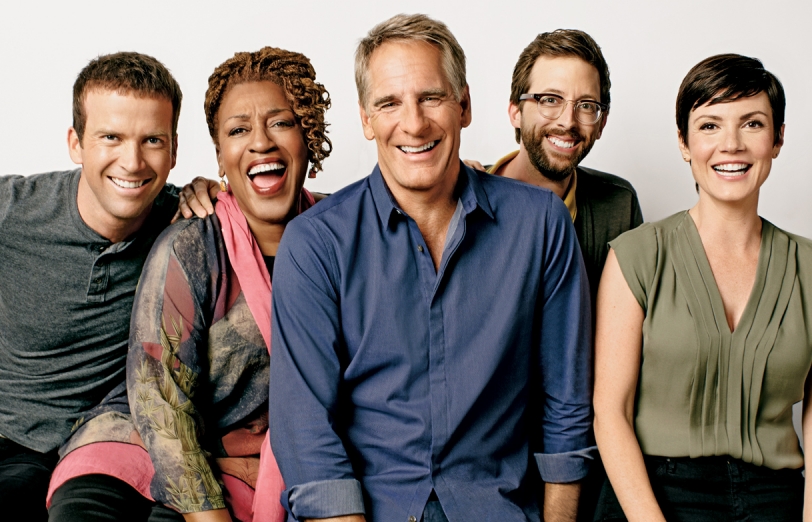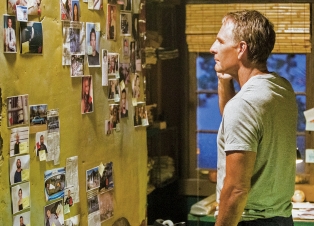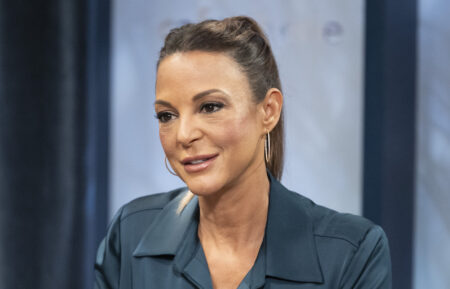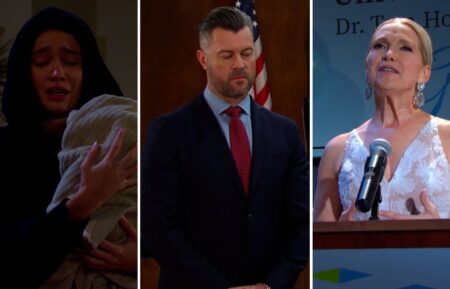NCIS: New Orleans Celebrates Life in the Big Easy (Even When It Isn’t)

At a recent photo shoot, the five principal cast members of NCIS: New Orleans have just come in from filming a scene at the soundstage next door, but you might think they’d dropped by after a night at Tipitina’s, the Spotted Cat, d.b.a, or one of Orleans Parish’s other celebrated nightspots. Things are getting loosey-goosey–emphasis on the goosing–as the quintet squeezes in tight. Lucas Black is tickling Zoe McLellan. McLellan is borrowing Rob Kerkovich‘s glasses for that sexy librarian look. It’s up to Scott Bakula to provide the voice of reason. “We’ll hate these shots, I guarantee you,” he says, right after having his manly bosom groped from behind by CCH Pounder.
“Are we confused as to the nature of this procedural?” asks Pounder, suddenly sounding a sober note as she takes her mitts off the series’ star.
“This is full-on thank God it’s Friday,” says Kerkovich, usually the show’s comic foil, adding his own note of mock solemnity to this touchy-feely free-for-all: “So many people have died so far.”
Well, yes, they have, rather reliably, at the predictable rate of one corpse per week, with occasional bonus deaths in instances involving a mad bomber or some such. CBS’s NCIS: New Orleans didn’t get to be the season’s top freshman show by not playing by the procedural rules. What sailor would want to be stationed here after watching a series, which, if taken literally, suggests that Louisiana has an exponentially higher mortality rate among active and former servicemen and servicewomen than any other seaport state?

Probably a lot of impressionable petty officers are champing at that bit, actually, since the series also suggests that it’s worth the risk of being infected with bubonic plague, murdered vampire-style in a cemetery, poisoned with radiation, or shot during Mardi Gras just to live and thrive amid the city’s infectiously celebratory spirit. And although all the principals have been given–in typical NCIS-franchise fashion–slightly angsty backstories, a typical episode is less likely to end on a brooding close-up than with the characters cooking gumbo for one another in the squad room’s kitchen. And can it even be called a squad room, when the cozily funky office set looks like the House of Blues blew up, albeit with most-wanted lineups on the overhead monitors instead of drink specials?
If procedurals are a kind of comfort food, the good-times-and-autopsies mélange of NCIS: New Orleans managed to attract a whopping 18 million viewers (including DVR), on average, in Season 1 by being primetime’s oysters on the shell or its sugary beignet or nightcapping Sazerac.
“Part of what drew me to setting a show down there,” says creator and executive producer Gary Glasberg, “is the contrast of people who work hard and have faced all kinds of adversity, whether it’s Katrina or socioeconomic problems, but hold on to each other and rise up and celebrate regardless. And the beauty of New Orleans is that there’s literally a parade or festival for everything. So you’re constantly working around that.” Sometimes they’re also working around that festiveness psychologically, as the city’s eternally high-spirited side can carry over into a kind of light-headedness at the workplace.
“But,” says McLellan (Agent Meredith Brody), “then we have to be reminded, ‘OK, someone’s dead,’ and remember the urgency of the story we’re telling. Especially when the baby was missing [in the April episode “Rock-a-Bye-Baby”]. It’s like, ‘You care about this baby!’ Got to find the baby! Find the Navy baby!” That last singsongy catchphrase has become a running joke between Black and McLellan–with apologies to missing naval infants everywhere, we’re sure.








